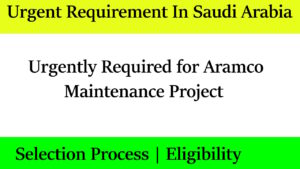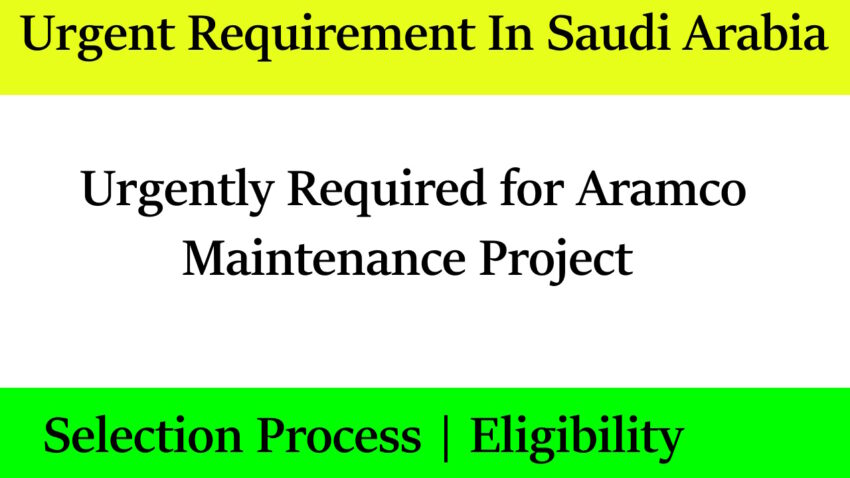Job Opportunity in Saudi Arabia: Urgently Required for Aramco Maintenance Project
Positions Available:
- Diesel Mechanic
- Hydraulic Mechanic
- Diesel & Petrol Mechanic
- Diesel & Hydraulic Mechanic
Experience Required:
The company is looking for skilled individuals with experience in maintaining Heavy & Light Equipment, including but not limited to:
- Bus / Van / Car
- Tanker / Trailer
- Dumper / Dump truck
- Wheel Loaders, etc.
Immediate Processing:
This is an urgent requirement for the Aramco Maintenance Project in Saudi Arabia. The recruitment process is underway, and interested candidates are encouraged to apply promptly.
Benefits:
Successful candidates will receive an excellent salary package along with additional perks such as free food, accommodation, and transportation. Medical examinations (GAMCA Medical) will be facilitated as part of the hiring process.
Contact Details:
To apply or inquire further, please contact:
- Email: jobs@alyousufent.com
- Phone: +91 72083 53908

Regulatory Compliance:
ACE Alypousuf is registered under the Ministry of External Affairs, Government of India, with RC -13 • 1487 1 MUM 1 PART 11000.1 9986 1 2022.
This is a great opportunity for skilled Heavy Equipment professionals to contribute to the Aramco Maintenance Project in Saudi Arabia. Apply now and be a part of a dynamic team in a thriving work environment!
Navigating the Interview Process for Diesel Mechanics, Hydraulic Mechanics, and Petrol Mechanics in the Gulf Region: A Comprehensive Guide
Introduction:
The Gulf region, renowned for its flourishing industries and booming economy, is a hub for various sectors, including automotive and heavy machinery. Within these industries, diesel mechanics, hydraulic mechanics, and petrol mechanics play vital roles in ensuring the smooth operation of vehicles and machinery. Securing a position in these fields requires not only technical expertise but also navigating through a rigorous interview process. In this article, we will delve into the intricacies of the interview process for diesel mechanics, hydraulic mechanics, and petrol mechanics in the Gulf region.
Understanding the Roles:
Before diving into the interview process, it’s crucial to comprehend the distinct responsibilities associated with each role:
- Diesel Mechanic: Diesel mechanics specialize in the repair, maintenance, and inspection of diesel engines found in automobiles, trucks, buses, and heavy machinery. They diagnose issues, conduct repairs, and ensure optimal performance of diesel-powered vehicles and equipment.
- Hydraulic Mechanic: Hydraulic mechanics focus on hydraulic systems present in various machinery, including construction equipment, cranes, and industrial machinery. They are responsible for repairing and maintaining hydraulic components such as pumps, cylinders, valves, and hoses to ensure efficient operation.
- Petrol Mechanic: Petrol mechanics, also known as automotive technicians, specialize in servicing and repairing vehicles with gasoline-powered engines. Their responsibilities include diagnosing mechanical and electrical issues, conducting tune-ups, and performing routine maintenance tasks to keep vehicles running smoothly.
Now, let’s explore the interview process for each of these roles:
-
Diesel Mechanic Interview Process:
a. Technical Assessment: The interview typically starts with a technical assessment to evaluate the candidate’s knowledge and skills in diesel engine mechanics. This may involve written tests or practical demonstrations where candidates are asked to diagnose and repair common diesel engine problems.
b. Experience Evaluation: Employers often inquire about the candidate’s previous experience working with diesel engines, including the types of vehicles or machinery they have worked on and the nature of repairs they have performed. Highlighting relevant experience and certifications can significantly enhance the candidate’s prospects.
c. Problem-Solving Scenarios: Candidates may be presented with hypothetical scenarios or real-life situations involving diesel engine malfunctions. They are expected to demonstrate their problem-solving abilities and propose effective solutions to address the issues.
d. Safety Protocols: Employers emphasize the importance of safety in diesel mechanic roles. Candidates may be questioned about their knowledge of safety protocols and their adherence to Occupational Safety and Health Administration (OSHA) standards.
-
Hydraulic Mechanic Interview Process:
a. Hydraulic System Knowledge: The interview panel assesses the candidate’s understanding of hydraulic systems, including components, functions, and troubleshooting techniques. Questions may cover topics such as hydraulic fluid properties, pressure control mechanisms, and fluid contamination prevention.
b. Practical Skills Assessment: Candidates may be asked to demonstrate their practical skills by disassembling and reassembling hydraulic components or performing hydraulic system diagnostics. This hands-on evaluation helps assess the candidate’s proficiency in hydraulic maintenance and repair tasks.
c. Equipment Familiarity: Employers seek candidates familiar with a wide range of hydraulic equipment commonly used in industries such as construction, manufacturing, and oil and gas. Candidates may be quizzed on their knowledge of specific hydraulic machinery and their experience working with different equipment models.
d. Safety Awareness: Similar to diesel mechanics, hydraulic mechanics must prioritize safety in their work. Interviewers may inquire about the candidate’s awareness of hydraulic safety practices, including proper use of personal protective equipment (PPE) and adherence to equipment operating manuals.
-
Petrol Mechanic Interview Process:
a. Automotive Knowledge: The interview begins with questions to assess the candidate’s knowledge of automotive systems, including engines, transmissions, brakes, and electrical systems. Candidates should demonstrate familiarity with modern vehicle technologies and diagnostic tools.
b. Diagnostic Skills: Employers evaluate the candidate’s ability to diagnose mechanical and electrical issues in petrol-powered vehicles. Candidates may be asked to describe their approach to troubleshooting common problems such as engine misfires, brake squealing, or electrical system failures.
c. Customer Service Orientation: Petrol mechanics often interact with customers, explaining repair procedures, providing cost estimates, and addressing concerns. Employers value candidates who possess strong communication skills and demonstrate a customer-centric approach to their work.
d. Adaptability to Technology: With advancements in automotive technology, petrol mechanics are expected to keep pace with new diagnostic tools, software programs, and electronic vehicle systems. Candidates may be questioned about their willingness to undergo training and adapt to evolving technologies.
Conclusion:
Securing a position as a diesel mechanic, hydraulic mechanic, or petrol mechanic in the Gulf region requires navigating through a multifaceted interview process that evaluates technical expertise, practical skills, and safety awareness. By understanding the specific requirements of each role and adequately preparing for the interview, candidates can enhance their chances of success in securing employment opportunities in these critical fields. Effective communication, problem-solving abilities, and a commitment to ongoing learning are essential attributes that can set candidates apart in the competitive job market of the Gulf region.

